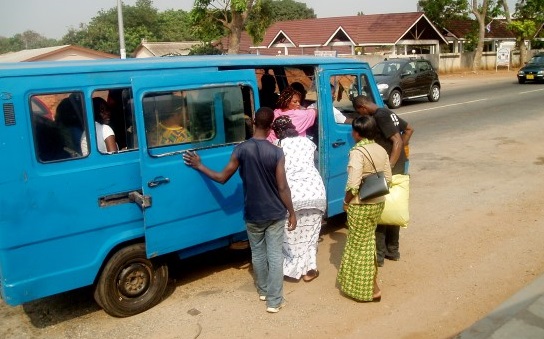‘Reduce passengers in commercial vehicles to deal with COVID-19 spike’
The fast-rising COVID-19 cases will require a slash in the number of passengers in commercial vehicles to contain the spread, the Chamber of Petroleum Consumers-Ghana (COPEC-Ghana) has admonished.
COPEC Ghana Executive Secretary Duncan Amoah believes the transport sector has an important role in stemming the tide.
He said authorities should be “thinking of protecting people more than protecting pockets”.
He emphasised: “It can only be necessary and reasonable that authorities take a second look at the transport seating arrangement”.
He told theghanareport.com, “We need to go back to the social distancing in vehicles to help deal with the more deadly second wave infection spread.
It would not be the first time to have such an arrangement as transport operators were asked to reduce passengers by one or two per seat depending on the vehicle’s size in March 2020.
Why the clamour for a reduction in commuters
The country’s total number of cases has skyrocketed to 6,411 as of the last update by the Ghana Health Service (GHS) on February 4.
Just a month ago, Ghana had 982 active cases, meaning the latest represents more than 550% increment.
COVID-19 has killed 464 with 32 people currently battling for their lives in critical conditions.
Hospitals and treatment centres are nearly at full capacity, unable to handle the pressure of severe cases.
The country is recorded over 700 daily average cases with total confirmed cases pegged at 71,533.
Recoveries/Discharge sums up to 64,658, but 112 people are still reporting severe symptoms.
The risk of contagion is high in crowded and enclosed spaces, and a reduction in commuters will improve ventilation and minimise contact.
Scientists have shown that the particles of COVID-19 – which is also released into the atmosphere when simply breathing and which can escape from improperly worn face masks – can infect people who spend more than a few minutes within a five-meter radius of an infected person, depending on the length of time and the nature of the interaction.
Tighter COVID-19 protocols
In his last address on COVID-19, President Nana Akufo-Addo re-introduced a ban on funerals, weddings, concerts, theatrical performances, and parties.
Beaches, night clubs, cinemas, and pubs were also shut. The country’s borders by land and sea are to remain closed.
But Mr Amoah argues that the President “cannot be asking for strict enforcement of COVID protocols and yet expect people to haggle in public transport systems”.
Increase in fares
When a reduction of passengers was implemented during the partial lockdown, some members of the Ghana Private Road Transport Union (GPRTU) raised concerns about revenue losses.
COPEC-Ghana is not opposed to a percentage increment to create a balance in income for transport operators.
He said it is only such a time that “some of us would agree that Ghanaians may have to pay a little more for transport fares”.
However, he pointed out that the recent hike in fuel prices should not be a reason to increase the fare.



